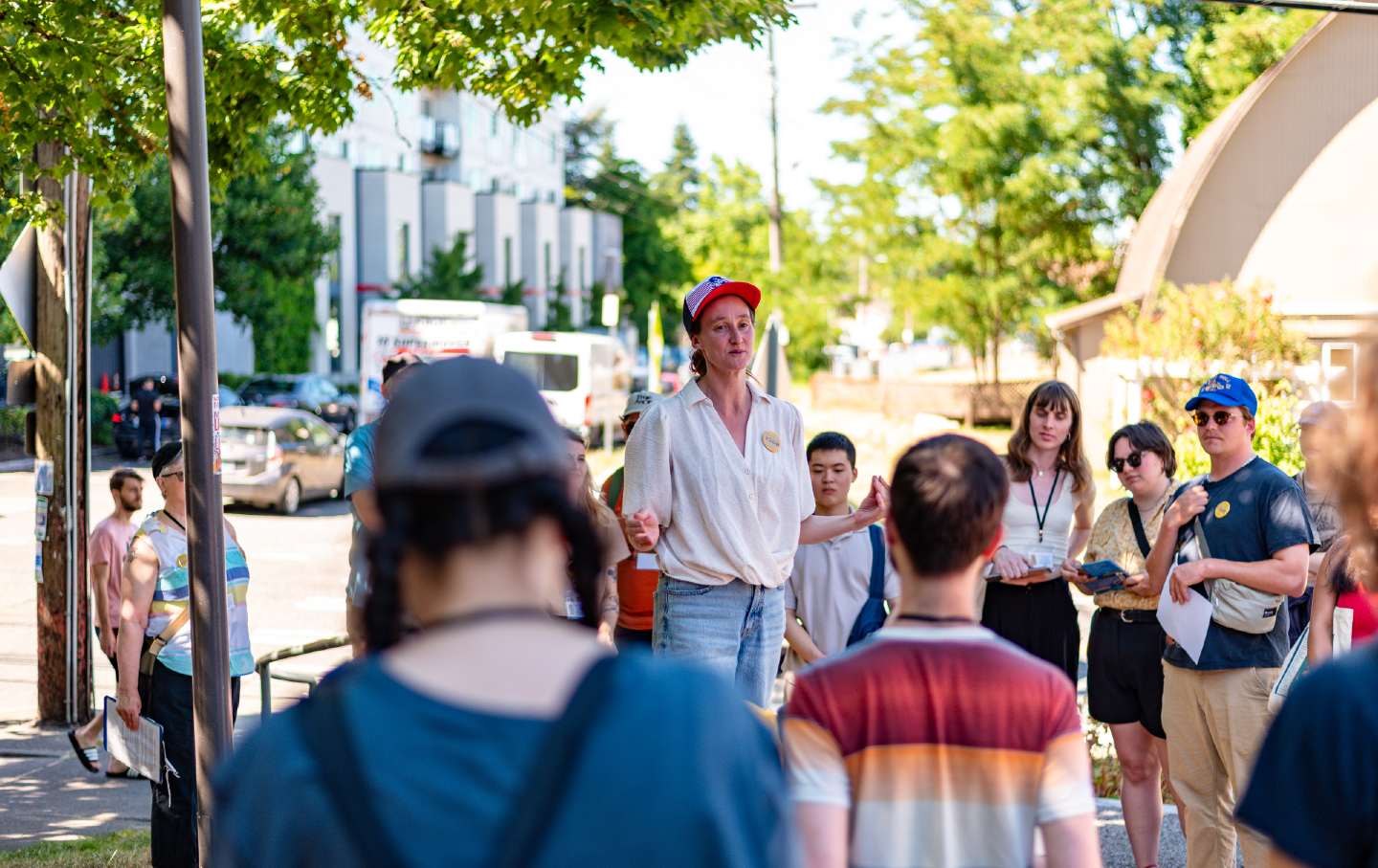July 18, 2025
She’s running on a populist economic message that puts affordability of care at its heart and mobilized young grassroots organizers.

Zohran Mamdani’s victory wasn’t a fluke. Right now, it is being built upon in Seattle, three time zones from the Big Apple. Seattle Mayor Bruce Harrell has been gliding along a path toward reelection. He has garnered the support of developers and tech oligarchs. All the opinion leaders are along for the ride with the mayor. Of course, he is going to win.
But weirdly, a vote of the people has challenged that wisdom. Last year, Seattle housing activists had gathered signatures for the City Council to pass a tax on excess compensation to fund social housing. The tax, to be paid by employers, levies a 5 percent tax on individual compensation greater than $1 million. Raising $60 million, and with bonding, this will enable the production of thousands of economically integrated housing units in which no tenants will pay more than 30 percent of their income in rent.
The City Council set a vote on this measure for February 11, expecting a low and conservative turnout. The council also put a competing measure on the ballot, which took $10 million from an existing fund for low-income housing to build a few units of social housing.
The corporate community, led by Amazon and Microsoft, poured hundreds of thousands of dollars into an opposition campaign. Mayor Harrell got into the act, with his face on all the opposition literature. The die seemed to be cast for a victory of the status quo over actual social progress. Only it wasn’t. The election resulted in a 26-point victory for social housing over the mayor’s proposal.
That got Katie Wilson, the founder and general secretary of Seattle’s Transit Riders Union, to rethink the 2025 elections. Katie had already launched the Transit Riders Union, gaining free transit for school kids and low-income people. She organized successful minimum-wage campaigns in Seattle suburbs. She developed the Jump Start tax, a tax on employers when individual compensation exceeds $189,371. Without this tax, Seattle would have been savaged with cuts in public services.
So Katie decided it was a good time to become mayor, to gain the power progressives need to transform our city. She embodies the policies and hopes and dreams of most of us in Seattle who can’t figure out how to pay for childcare and rent increases and healthcare, or those of us who recognize and want to provide the solutions for these issues.
Current Issue

Katie is a leader and a member of the precariat. She rents a one-bedroom apartment with her husband and 2-year-old daughter. She does not own a car. She bicycles and takes mass transit all around the city. She has lived on a shoestring budget for years. She understands childcare—she pays $2,000 a month for three days a week. Her campaign focuses on expanding workers’ rights, funding family housing, making childcare affordable and childcare compensation a ladder up, not a step down, and opening our parks and streets for walking, recreating, bicycling, and just plain being.
Does she have a chance? Seattle’s Democratic establishment and major labor unions have shown their willingness to whine about, but not challenge, the status quo that leaves millions of Washington residents with out-of-control healthcare costs, childcare costs, elder care costs, constantly rising tuition and underfunding of K-12 public education. But wait, the rank and file of every Democratic district organization has endorsed Katie Wilson. Could their lived experiences be closer to the reality of Seattle residents?
New York has ranked-choice voting, which enables little-known candidates to become legitimate contenders, not wiped out by plurality voting and dismissal by the power elite. While Seattle’s version of ranked-choice voting doesn’t begin until 2027, we do have a unique Democracy Voucher system. Every resident can use four $25 vouchers for city candidates. Six hundred residents must support these candidates. Then, every Seattle resident can contribute Democracy Vouchers to their preferred candidate. Through these Democracy Vouchers, Katie Wilson has mobilized tremendous grassroots support.
This funding stasis could be upset if the corporate community builds an “independent” PAC to boost Harrell. They have already polled for the “right” message. When that opposition campaign begins, Katie will be enabled to raise even more funds from Democracy Vouchers. Her thousands of volunteers will be spurred on to get out every possible vote for her.
Has Seattle had enough of business as usual? We will get an inkling of this in less than a month, in the August 5 primary. Perhaps, as Tracy Chapman sings, “finally the tables are starting to turn / Talkin’ ’bout a revolution…”


